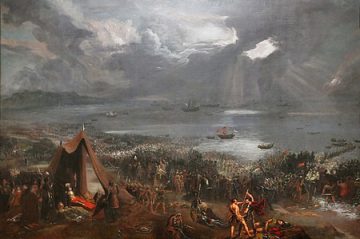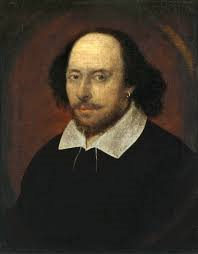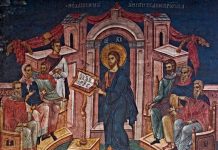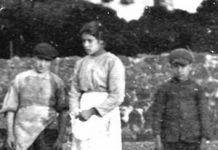Today used to be (*) a national holiday in England – as the people hearken back to an earlier and better time in the now tragically declined, if not lost, nation. For today is the feast of their patron, the semi-legendary Saint George, martyr for the Faith, slayer of the dragon and rescuer of princesses. This is also, by one of those remarkable coincidences of providence, the birth and death of their greatest playwright, yes, the inimitable William Shakespeare, who both entered and departed this life on this very English day, April 23rd, in 1564.
From all evidence, Shakespeare was a staunch and believing Catholic, a Faith he had to partly hide to maintain appearances, but whose truths he embedded, often not even so subtly, in many of his plays. He seems to have been a foe of the Church-dismantling-and-martyr-producing Tudors, Henry and daughter Elizabeth, even though with the ‘glory’ of ‘good’ Queen Bess’ reign the Bard is forever linked. He likely died with an ironic smile on his lips that they – the powers that be – never even knew. Strange how history works, and how God works through His witnesses, great and small.
Saint George (+303) is the patron not only of England (after the saintly King Edward the Confessor was dropped during the Protestant Reformation), but also of all the Crusaders in the Middle Ages, when the Christians strove to stop the aggression of the Muslim hordes overtaking the Holy Land.
From what we know with some degree of certainty, George was a Roman soldier, a convert to Christianity, put to death under Diocletian at the dawn of the fourth century, just before Constantine took over the whole Empire, and legalized the Catholic religion. George’s red cross on a white background, signifying shedding one’s blood for Christ, the crusader symbol, is now incorporated into the Union Jack.
Merrie England could do with a bit more of the Crusader spirit, that whole thing that helped defeat any and all invaders of the island kingdom, rather than the all-too wan, socialist, dependent, pusillanimous nation it has, with Canada, by and large become, a sad and bitter fruit of the loss of the one, true, Catholic and Apostolic Faith, and her, and our, descent into agnosticism, hedonism and new, and more insidious, kind of paganism. Into that vacuum, Islam and its attendant Sharia law have arrived. Yes, there yet be many dragons, metaphorical and otherwise – but so few now willing to fight them.
Curious that the newest royal, fifth in line to the throne, a boy, of course named George, was also born to Prince William and Princess Katherine. Perhaps the lad will eventually realize, like many of his fellow Englishmen and inspired by his patron saint, the folly of the Henry and his daughter Elizabeth’s Tudor ‘Anglicanism’, and return to the Faith of his ancestors, which made England great. One can hope, supernaturally; but methinks, with my more pessimistic, natural Irish hope, that be a long shot. But God likes long shots, and working against expectations, like a mere mortal, even a humble Jewish maiden, defeating Satan himself.
While we’re wandering on the British Isles, so to speak, this is also the day of the death of Brian Boru, the greatest of the high kings of Ireland, who united the fractious kingdom upon taking the throne as young man in 963, and High King in 1002. In his long and virtuous reign, he drove the rapacious, pagan Norsemen – Ireland had by then been almost fully converted to the Faith by Saint Patrick and his successors – back to the sea and their distant lands, freeing Erin’s isle from foreign domination (at least until, ironically, the English…but that’s another story).

In his last battle, in 1014, a Good Friday of all days, he and his soldiers had just about annihilated the Viking coalition at the Battle of Clontarf, outside Dublin, when a band of them retreating stumbled on the King’s tent, overcame his bodyguard, and slew the elderly Brian Boru, who lives on in memory. It is said that everyone named ‘O’Brien’ (son of Brien) is distantly descended from the King and, yes, my dear Irish grandmother from county Donegal was Kathleen O’Brien, God rest her royal soul.
Have a listen, if you will, to Brian Boru’s march, this version by Irish flautist James Galway:
While we’re on dragons and millennia, a good read for today’s times is Etienne Gilson’s brief treatise on the Terrors of the Year Two Thousand which was published in 1949, a few years after the end of the Second World War, when it seemed the Anti-Christ had nearly triumphed. As Wellington remarked of a previous momentous battle a hundred years earlier, ‘it was the nearest-run thing you ever saw in your life’.
Yet, as Gilson warned with the rubble of the blitz still strewn about London, the horrors of the war were but a sign of things to come, and the prescience of the Thomistic professor’s clear words give one a bit of chill, as what he prophesies has by and large come to pass.
We are now in the ‘terrors’ of the new millennium, but we must not, with George of old, let fear and anxiety overwhelm us. If we are on the side of God, truth and goodness, who can be against, even if, with Saints George, Brian Boru and Thomas More, the best of England and Ireland, in different epochs and against different dragons, our very heads might roll?
Saint George, ora pro nobis!
(*) A previous version of this reflection said that today was a national holiday in England, but I was corrected yesterday by one of out international students, who is from England, and says it has been quite some time Saint George’s day was a national holiday. Alas. Just as in Canada – Saint Joseph’s day should be a day of country-wide celebration, but I doubt most Canadians even know Saint Joseph in their patron. And what are we to say of modern Englishmen, and Saint George? The new wave of residents arriving on the shores each day would certainly demur at celebrating the patron of the Crusades…










